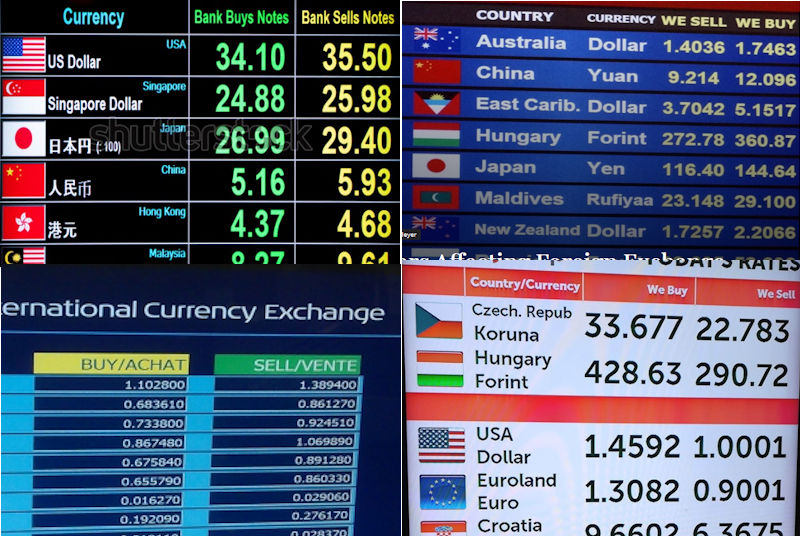Top 10 Tips On Market Trends In Terms Of Currency Exchange And Rates
Anyone who is involved in business, travel or investment management must understand market trends. Market trends define the general direction that the economy or prices are moving over a specific time. They are influenced by many factors, including economic data, geopolitical events and consumer behaviour. Travelers can benefit from recognizing trends that can help them improve their currency exchanges and to plan their budgets. For businesses, keeping up-to-date with market trends can to guide pricing and strategic choices. Investors should use market trends to make informed decisions on purchasing and selling assets. Below are the top ten specific guidelines for monitoring and utilizing market trends to your financial activities.
1. Keep abreast of economic indicators
Economic indicators such as GDP growth, unemployment rates as well as consumer confidence can have a huge impact on the direction of market trends. Keep track of these indicators frequently to gain insight into the overall economic health and possible currency movements. You can interpret market conditions more efficiently by using websites like those from the Bureau of Economic Analysis (BEA) or Federal Reserve.
2. Utilize Financial News Sources
– Reliable financial news sources that include Bloomberg, Reuters, and CNBC, offer up-to-date details on market trends as well as the events that impact different sectors. Subscribe to newsletters to keep up to date with market changes, economic forecasts, expert opinions, and market trends. These sources of information can help you make informed choices about your business, travel, and investment strategies.
3. Leverage Online Analytical Tools
TradingView and MarketWatch offer historic data and charts as along with technical analysis that are used to analyze the market's trends. These tools can be used to identify patterns and trends within the markets. This will help you to make better decisions regarding your travel plans, business, or investments.
4. Understand the seasonal patterns
A lot of markets experience seasonal fluctuations which affect pricing and demand. The peak of tourism can occur at certain times of the year and can affect demand for currency and rates. Understanding seasonal fluctuations can help you adapt your travel and business strategies according to consumer behavior. You may want to time your currency conversions based on the fact that off-peak seasons tend to have better exchange rates.
5. Geopolitical events are monitored
The geopolitical impact of events such as trade agreements, elections, and wars, can dramatically influence market trends and value. Be aware of international events that may affect regions where you conduct business, travel or invest. For example, a change in the policy of a government could trigger changes in the currency in a particular country, which could impact your travel or investment budget.
6. Social Media is a great opportunity to access real-time data
– Social media platforms like Twitter and LinkedIn can offer real-time information on economic and market news. Follow the market's top traders and financial analysts to gain a better understanding and perspective on the current market. Joining online communities that relate to your business will allow you to stay on top of the latest news and exchange information.
7. Check out the past to find patterns in data
Historical data can offer useful insights into how markets have responded to similar situations over time. Through studying patterns in the past, you can identify potential patterns and make educated predictions about future movements. This is an effective method for investors who are trying to identify long-term patterns or businesses who are seeking pricing strategies that take into account the behavior of consumers in the past.
8. Include Trend Analysis in Your Plan
– Trend analysis involves evaluating historical price data to identify patterns and to make predictions regarding future trends. To find the most favorable exchange rate, travelers can monitor currency trends. Businesses can benefit from trend analysis by determining pricing strategies, marketing plans and other aspects. Investors can pinpoint the best entry and exit locations to maximize their profits by using trend analysis.
9. Diversify your sources of information
– Relying on a single source of information could result in a narrow understanding of market developments. Diversify the sources you use by consulting multiple financial news outlets along with economic reports and online analysis tools. You will be able to gain a better knowledge of the market by mixing various perspectives.
10. Consult Financial Advisors
Talk to a Financial Advisor If you're unsure of what to make of market shifts or how they could impact your financial plan. These professionals provide tailored advice to suit your situation as well as help you devise strategies to navigate the market. Experts can assist you with budgeting, optimizing operations or managing a portfolio.
By following the detailed tips below on how to track and make use of market trends, it is possible to control your investments as well as conduct business and travel more effectively. Understanding trends in the market will allow you to make smarter financial decisions that align with your business or personal objectives, ultimately improving the overall strategy for financial planning and results. View the best CAD to USD url for site examples including usd to pakistani rupee, usd jpy, us dollar to php, usd to euro exchange rate, dollars to pounds, canadian dollar to usd, convert pounds to dollars, 1 usd in rupees, us dollar to php, usd to pound sterling and more.

Top 10 Tips For Destination Currency And Currency Exchange Rates
Understanding the currency of the destination of a country is important for anyone who is conducting international business or managing the foreign exchange market. The destination currency is the currency of the country that you are visiting, or with whom you are in an engagement. It can impact your financial decision. Changes in the exchange rate and conversion fee as well as the economic climate in general could affect the amount you travel or how profitable business deals and investments are. If you are familiar with the destination currency and its ramifications, you can optimize your financial strategies and make educated decisions. Here are 10 tips to help you handle destination currency effectively in your financial ventures.
1. Before travel, it's essential to study the currency in the country.
Learn about the currency in the local currency prior to you go to a different destination. Learn the exchange rate of your currency versus that of other nations, and discover the value of your currency. It is easier to manage your budget and avoid spending too much once you know this information. Websites like XE.com let you see the current exchange rate and the historical information. This lets you estimate what your money is worth in foreign currency.
2. Check Exchange Rates Prior to Your Travel
Monitoring these changes will help you to determine the best moment to exchange your money. You can set up alerts through software and tools for tracking currency to be notified when the exchange rate is in a favorable position. If you observe that the currency has been declining over time, it's beneficial to convert currency earlier to increase your purchasing power.
3. Currency Conversion Costs to Consider
– Currency conversion fees differ widely between banks, exchange services, and ATMs. Be aware of the costs for the conversion of your home currency into the currency you'll be using, as they can be added to the cost of your. Review rates from a variety of providers and consider using online platforms that offer affordable exchange rates as well as lower fees for currency conversion.
4. Utilize the local currency for transactions
If you are purchasing items from abroad, always opt to pay in the local currency rather than the currency you use at home. If you decide to pay in your local currency it will often result in the use of a dynamic currency converter (DCC) that will charge higher fees and less favorable exchange rates. You may benefit from lower exchange rates if you pay using your local currency.
5. Plan for your cash needs in advance
Even though credit and debit cards are accepted in many countries, you must keep cash on hand for smaller purchases like tipping, cash, or any other establishments that may not accept credit cards. Consider withdrawing more money at once to lower the cost of transactions. Examine the ATM's fees and limits prior to using an ATM abroad. Being prepared with local currency can make travel more enjoyable and less stress-inducing.
6. Know Local Preferences for Payments
– Different countries have varying preferences for payment methods. Cash is the preferred method in certain countries, while credit cards and digital transactions are more common elsewhere. Discover the local payment practices to discover what's the most popular. This can help plan your payments and make sure that transactions are carried out without problems.
7. Business Currency Risks: Be Watchful
If you're conducting business in a foreign country be aware of the potential risks to the currency due to changes in exchange rates. Any sudden change in value of the currency that you are using can affect profit margins and the overall financial performance. Utilize hedging strategies like forward contracts to lock in future exchange rates and reduce potential losses due to fluctuating currency.
8. Be aware of your spending
Be aware of your expenditure while on holiday in the currency of your destination. Keep track of your expenditure using budgeting software or keeping an accurate list of every expense. You'll be able monitor how much you spend in the local currency and avoid overspending.
9. Financial Regulations: You Should Know Your Rights
Each country has its own laws regarding the exchange of currency, cash transactions and reporting obligations. It is recommended to familiarize yourself with these regulations to avoid legal problems when travelling or conducting business. For instance, certain countries might have restrictions in the quantity of cash you are able to bring in and out, while other countries may require you to declare large transactions. Be aware of these regulations to help to navigate these rules smoothly.
10. Consult currency specialists for Investments
Get advice from experts in currency or with experience in international investing if you're monitoring your investments on foreign markets. They can offer insights on how fluctuations in currency affect your portfolio of investments. They will also help you to develop strategies that effectively manage the risks associated with currency. They can assist you in navigating the complex world of destinations currencies in order to maximize your financial outcome.
These detailed guidelines for managing destination currencies can help you navigate the maze of travel, doing business and monitoring your investments. Understanding the significance of destination currency will allow you to make smarter financial choices that meet the goals of your company and personal life. Read the top CZK to EUR url for more examples including gpb to usd, usd to rmb, inr to usd, jpy usd, usd to indian rupees, 1 usd to inr, dollar to rupee, us dollar to mexican peso, us dollar to colombian peso, doller to rupee and more.

